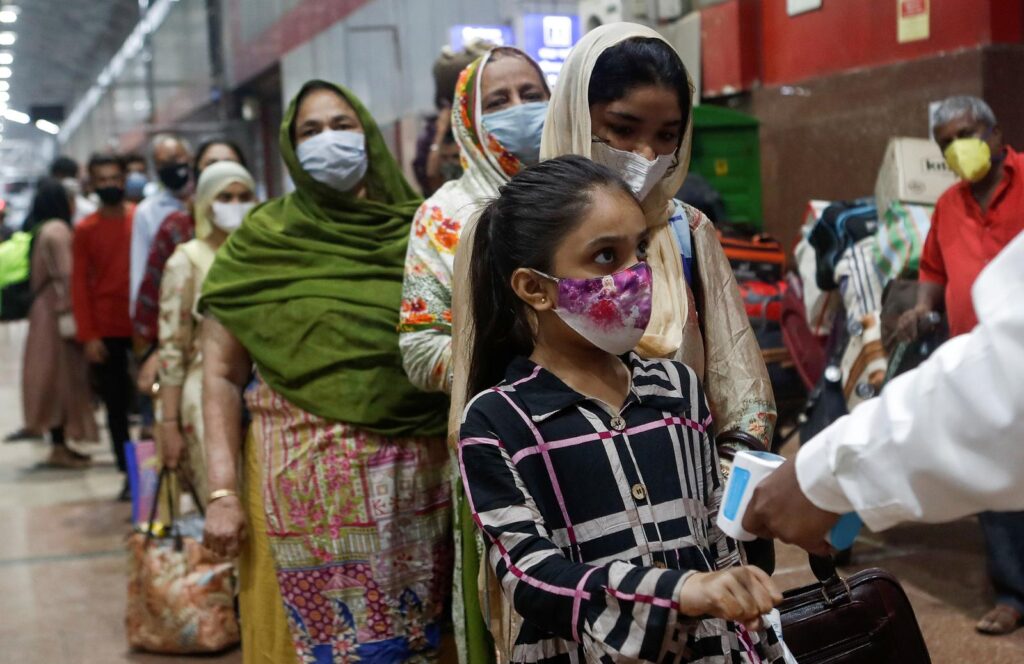Past Covid Infection Does Not Fully Protect Young People: Study

Passengers wait in line to get their temperature checked at a railway station in Mumbai during the coronavirus outbreak
A past COVID-19 infection does not completely protect young people from reinfection, and vaccination is still necessary to boost immune response and reduce disease transmission, according to an observational study published in The Lancet Respiratory Medicine journal.
The research was conducted on more than 3,000 healthy members of the US Marines Corps, most of whom were aged 18-20 years.
The researchers from the Icahn School of Medicine at Mount Sinai in the US emphasised that young people should take up the vaccine wherever possible.
They noted that despite previous infection and the presence of antibodies, vaccination is still necessary to boost immune responses, prevent reinfection, reduce transmission.
“As vaccine roll outs continue to gain momentum it is important to remember that, despite a prior COVID-19 infection, young people can catch the virus again and may still transmit it to others,” said Professor Stuart Sealfon, of Icahn School of Medicine at Mount Sinai, a senior author of the study.
“Immunity is not guaranteed by past infection, and vaccinations that provide additional protection are still needed for those who have had COVID-19,” Sealfon said.
In the study, conducted between May and November 2020, around 10 per cent or 19 out of 189 participants who were previously infected with SARS-CoV-2 (seropositive) became reinfected.
This was compared to new infections in 50 per cent (1,079 out of 2,247) of participants who had not previously been infected (seronegative).
Although the study was in young, fit, mostly male Marine recruits, the researchers believe that the risk of reinfection found in their study will apply to many young people.
In the study, US Marine Corps recruits completed an unsupervised quarantine at home for two weeks before entering a Marine-supervised quarantine facility for another two weeks.
They received antibody tests to establish whether any of the recruits were seropositive or had previously been infected with SARS-CoV-2 and had antibodies.
They were also tested for new SARS-CoV-2 infection at baseline then weeks one and two of the quarantine, and completed a questionnaire including demographic information, risk factors, medical history and COVID-19 symptoms.
Of the 2,346 Marines followed long enough for this analysis of reinfection rate, 189 were seropositive and 2,247 were seronegative at the start of the study.
Across both groups of recruits, there were 1,098 (45 per cent) new infections during the study.
Among the seropositive participants, 19 (10 per cent) tested positive for a second infection during the study.
Of the recruits who were seronegative, 1,079 (48 per cent) became infected during the study.
In the study, most new COVID-19 cases were asymptomatic — 84 per cent (16 out of 19 participants) in the seropositive group vs 68 per cent (732 out of 1,079 participants) in the seronegative group — or had mild symptoms, and none were hospitalised.
“Our study shows that some individuals with lower levels of neutralising antibodies were reinfected, indicating that it is possible that previously infected and recovered people are susceptible to new SARS-CoV-2 infection at a later time,” said Dawn Weir, of the Navy Medical Research Centre, US.
“These reinfections may be asymptomatic, as observed in the majority of our participants,” Weir said.
The researchers note some limitations to their study, including that it likely underestimates the risk of reinfection in previously infected individuals because it does not account for people with very low antibody levels following their past infection.





